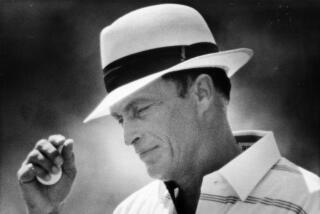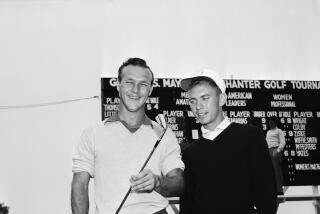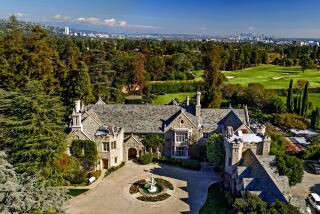THE PGA’S ANGRY MAN : Mac O’Grady Will Talk to Certain Reporters, but Press Tent Is Still Out
- Share via
DENVER — Mac O’Grady, the Los Angeles golfer who refused to talk to reporters while leading the Byron Nelson tournament last May in Dallas, still won’t go to the press room.
Wednesday at the Cherry Hills Country Club, where he will tee off today in the 67th PGA tournament, he explained why in a private interview with The Times.
“I was victimized by an article in Sports Illustrated last year that made me appear to be nothing more than a freak show,” he said. “It was sleazy, slimy National Enquirer journalism. I used those words on television during the Byron Nelson tournament, and I still say it.
“There were about 40 inaccuracies, made-up quotes and statements that traumatized me when I read it, things like my being critical of Johnny Miller and Jack Nicklaus, playing football in a West Los Angeles cemetery, breaking into a Bel-Air mansion to sleep, things like that that were not true. I spent six weeks off and on talking with the writer and photographer and tried so hard to cooperate, but everything I said came out like garbage.
“That article established a biographical, historical tree that has followed me ever since and will continue to plague me. Every place I play, writers dredge up the article and perpetuate the falsehoods and the inaccuracies.”
Had that article been O’Grady’s only protest, he might have taken his case to the press and explained his side, but a couple of weeks earlier, another incident affected his attitude.
It involved not the press but Deane Beman, commissioner of the PGA Tour.
O’Grady was accused of telling a volunteer worker at the USF&G; tournament in New Orleans that the tournament “was the worst run and most unorganized tournament on the tour.” Beman fined him $1,000, which was later reduced to $500, for “conduct unbecoming a professional.”
O’Grady claimed he never made the statement--which did not appear in print and was not broadcast on radio or TV--and refused to pay the fine. This year, when the season started at the Bob Hope Classic, $500 was deducted from O’Grady’s earnings of $2,965.
“It was bad enough to be fined for something I didn’t do, but worse than that was having Beman deny me my First Amendment rights of free speech,” O’Grady said. “Then he totally disregarded due process in taking my money. He literally stole it from me. I’m not a member of a team, getting a salary. The PGA doesn’t pay any of my bills.”
O’Grady also claims that on Dec. 28, he was given 30 days to pay or be fined, but that the money was taken from his check Jan. 13.
“I would not have paid it, but they didn’t even wait until their time limit was up,” he said bitterly.
O’Grady’s attorney, Glenn Cohen of Jacksonville, Fla., has a suit against Beman and the PGA pending.
So, after O’Grady shot a course-record 63 on the Las Colinas course near Dallas in the first round of Nelson’s tournament, he rebelled when Tom Place, PGA Tour director of information, asked him to come to the press tent.
“Tom told me I had to go, that I would be fined if I didn’t,” O’Grady said. “I told him that was interesting, that I had been fined before for talking too much, and now I was going to be fined for not talking at all. I was going to be damned if I did and damned if I didn’t.”
Place, denying that he ever mentioned a fine, said: “I told Mac that he was not obligated to appear, but that he had an obligation to, an obligation to his fellow players, sponsors and all the newspapermen who had never hurt him. I tried to explain the difference, but he still refused.”
When a tournament leader is interviewed in the press tent, the main item discussed is how he played the round, the birdies and bogeys, the good and the bad breaks. It was particularly important that day because O’Grady had broken a course record.
O’Grady said: “I told Tom I would give him the details of my round and he could distribute it, but he said, ‘No, you’d better come to the press tent yourself.’ Well, I knew all they would want to talk about was my past, the years when I was Phil McGleno, the years when I was a struggling kid living a day-to-day existence in Los Angeles. I didn’t want to go through that again.”
O’Grady, 34, was an all-around athlete at Hamilton High in West Los Angeles as Phil McGleno, before concentrating on golf. He changed his name to Phillip McClelland O’Grady in 1978 in an attempt to escape his past. O’Grady was his mother’s maiden name.
Place said: “I told him I would tell the media that he wanted to discuss nothing but his round, that I would protect him from the other questioning. He said no. He did not offer me a report on his round until an hour later, after giving it to a Japanese newsman. I told him no thanks at that time, because the Japanese writer had already given it to me.”
The slight to the press in Dallas was aggravated when it became known that O’Grady had given his birdies-and-bogeys report to Koji Shiraishi of the Tokyo Sports News.
O’Grady’s wife, Fumiko Aoyagi, is Japanese, and disgruntled American newsmen claimed--some wrote--that O’Grady had given an interview to the Japanese press so his wife could read about it in Japan.
“That is totally untrue,” O’Grady said. “As I was walking away from Tom (Place), I ran into Koji, who is an old friend of mine and Fumiko’s. He asked me about my round and I told him. I did not have a press conference with the Japanese press corps. I talked only to Koji.”
Another item in the SI article that nettles O’Grady is that his wife’s name was misspelled.
“We spelled it out, A-o-y-a-g-i, for him, and that’s the way it appears in the PGA Tour guide. It came out Aoyago. That might be a small point, but it is representative of the whole article. You would think it wouldn’t have been too difficult to get it right, wouldn’t you?”
Steve Wulf, the article’s author, said he was puzzled at O’Grady’s reaction.
“The overwhelming reaction from readers was favorable,” Wulf said by phone from New York. “A lot of them wrote in saying it was going to make them root for Mac.”
Of O’Grady’s major points at issue, Wulf said: “I was walking the course with him during the Crosby while he was discussing Miller and Nicklaus. He saw me taking notes. If he says he was misquoted, it’s not true.
“When I talked to him about playing football and hitting a whiffle ball at the mortuary, Mac posed for a picture swinging a golf club in front of Marilyn Monroe’s gravestone. He was sort of kidding around about it.
“Maybe he is right about not actually breaking into the Bel-Air mansion, but he did stay there for a month without permission.”
O’Grady continued to lead the tournament for three days, shooting 63-69-69, 12-under par, and lead Payne Stewart by three strokes. He was quoted by Golf World as saying, after the third round: “As far as my career is concerned, I feel like a little salmon swimming upriver to find the place of its birth. I’m so pleased to be where I am right now. It’s a bigger victory today--right now--than it would be tomorrow.”
It turned out to be. On the last day, O’Grady bogeyed two of the first four holes and Stewart birdied three of them to take the lead. O’Grady finished with a 74 and ended up tied for third with Tom Watson behind Bob Eastwood and Stewart, who lost in a playoff.
“Some days the putts drop and some days they don’t,” he said Wednesday in discussing the Nelson tournament. “I had five putts lip out on the front nine. It was terribly frustrating, but it was a lesson.
“Great players have always said that you can’t force a win, that you have to let it happen. The opposite is also true. You can’t fight bad things, you have to let them happen and go on. If you dwell too much, and fight too hard to prevent bad things, only more bad things will happen. You must move on passively.”
O’Grady, who made 17 attempts to get his tournament player’s card before he succeeded in the fall of 1982, is in his third year on the tour. He will tell his story to the golfing media, he said, when he wins a tournament.
“If you try to develop a personality in the PGA, like Chi Chi (Rodriguez), or Lee Trevino or Fuzzy Zoeller, you’d better have the performance record to back it up. If you’re not a winner, you get labled as being crazy, a zany space cadet. If you act the same way, and win, you’re a great guy and they call you ‘colorful.’ The thought nauseates me, but it’s true.
“I’m not saying I will win a tournament, but I will not get the stigma off my back until I do. Only then will I get respect for the way I play this game of golf, the way I have dedicated my life to becoming the best possible golfer I can. Until then, I’ll always be some sort of eccentric to the media. When I came out here on tour I tried to be too humorous, too frivolous with the press. I just wanted to have fun, but it was a big, big mistake of mine.”
O’Grady has been close to winning. He was only one shot out of the lead in the Las Vegas Invitational with three holes to play. He finished third and won $64,000, his biggest paycheck.
This season, he stands third in distance off the tee, averaging 274.8 yards. Only Andy Bean at 277.1 and Fred Couples at 274.8 are longer. And he is in the top 10 in greens hit in regulation. His earnings of $143,920 rank 34th on the PGA list.
Today’s PGA, the last of the 1985’s four major events, is O’Grady’s 21st tournament. He has made the cut in 11 of them. He missed four cuts after he was hit in the forehead by the door of a bus in Las Vegas. The freak accident gave him a partial basal skull fracture and a severe concussion.
O’Grady was walking on the sidewalk, head down in a dust storm, in front of the Tropicana Hotel the night the Las Vegas tournament ended. Suddenly, a bus driver opened his door and the metal edge caught O’Grady flush on the forehead.
“It knocked me to the ground and I started spouting blood all over me,” he said. “I was just leaving for the airport to fly to Florida for the TPC. After I filled out a report on the accident, Fumiko and I went to the airport and flew to Jacksonville. I was woozy and disoriented on the flight.”
After the first round of the Tournament Players Championship, in which he shot a 77, O’Grady told tournament officials that he felt ill and checked into a hospital. The next morning his heart stopped for more than a minute, and he was rushed to the intensive care ward.
“I woke up and there were all those doctors and nurses staring at me like I was dead,’ he recalled. “My blood pressure dropped to 60 over 40, and one of the doctors said if I hadn’t been so fit physically, I would never have come through it.”
O’Grady said that the cardiac arrest was the result of an injection of the wrong medicine and that he was suing the doctor responsible.
The hospital stay isn’t what O’Grady remembers most, however.
“I never got a call from a single person in the PGA Tour office,” he said. “I had withdrawn from their own tournament and they knew I had gone to the hospital, but they didn’t call even one time to inquire about me.”
Cardiologists told O’Grady it would take about 40 days before his coordination would recover sufficiently to play tournament golf. He was impatient and couldn’t wait.
A week later, he was at Greensboro but had to quit after nine holes. “I couldn’t break 90 in my practice rounds and was eight over par after nine holes in the tournament.”
He missed the cut in two more tournaments but kept improving. The first round of the Nelson, when he shot 63, was 40 days after his accident.
“It shows those doctors knew what they were talking about, doesn’t it?” he said.
O’Grady, however, said he has special feelings for surgeons. If he weren’t a professional golfer, he says, he would want to be a medical student. In fact, he talks of his golf career in terms of a medical student.
“I am trying to cram six years of medical school into three years,” he said. “I am in a residency program on the tour. I don’t want to miss any rungs on the ladder while getting to the top.
“Some of these kids come out and want to skip their residency. They want to be neurosurgeons in two years. They come out here so fast out of college they don’t realize what a privilege it is to play with the greats of their game, to be socially connected to them.
“Every day is a new, wonderful day when what you want to do is play golf, and you’re doing it at the finest country clubs and on the finest golf courses in the world.
“That is what upsets me so about the (SI) article. Can you imagine me, in my second year on the tour, telling a writer what’s wrong with Miller or Nicklaus? I would never do that about my peers. It embarrasses me every time I see them. I told them I didn’t say what was printed, but there it was, in black and white.
“And I would never chastise some volunteer worker. I’ll bet no one on the tour enjoys them, or appreciates them, more than I do. They make it possible for me to play. Without volunteers, there wouldn’t be a tour. I have been on courses all over the world, some that weren’t really courses. And Mr. Beman thinks I would criticize New Orleans. I told him I would play New Orleans every week for the rest of my life to be on this tour.”
In a curious pairing for the first two rounds of the PGA, O’Grady will play with David Ogrin and Frank Conner. Ogrin was fined by the PGA a few years ago for writing a magazine article critical of several fellow players.
O’Grady insists that he doesn’t want to be labeled eccentric, or zany. Still, he came here to Cherry Hills to get ready for the PGA and played part of his practice round left-handed?
“I’ve been practicing left-handed every day for the last six months,” he said. “I want to play in Johnny Miller’s team tournament (the Chrysler Team Invitational in December) as my own team, playing one ball left-handed and one ball right-handed.”
What’s zany about that?
More to Read
Go beyond the scoreboard
Get the latest on L.A.'s teams in the daily Sports Report newsletter.
You may occasionally receive promotional content from the Los Angeles Times.










